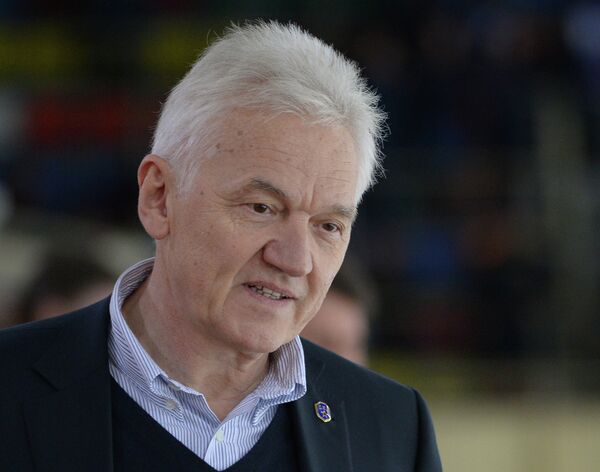MOSCOW, September 15 (RIA Novosti) - Western sanctions against Russia are unlikely to affect Russia's oil and gas industry and may even open up new opportunities for closer cooperation with its Asian partners and new projects for the country's oil companies, according to industry insiders.
Anti-Russian sanctions may accelerate Russian-Chinese cooperation in energy, Gennady Timchenko, head of the Russian-Chinese Business Council, said Monday.
"There is an obvious trend toward closer cooperation with our Asian partners that has both economic and political causes. … I think western sanctions can significantly boost our cooperation," Timchenko said in an interview with Kommersant newspaper Monday.
"Bureau of Geophysical Prospecting, Chinese company carrying out seismic works in Western Siberia, already works in Russia. CNPC [China National Petroleum Corporation] also has its world-class technologies. Huawei is seeking leadership in providing oil and gas industry with information technologies," he added.
According to the expert, Chinese companies are ready to invest in the development of Russian oil, gas and coalfields, as well as infrastructure, car and aircraft industries among other areas. In its turn, Russia is interested in working in China.
Sectoral sanctions imposed on Russia fail to inflict a severe damage on Gazprom Neft and its partners, and even encourage further development of the company, Vadim Yakovlev, deputy chairman of the management board and first deputy chief executive.
Speaking of the new round of sanctions introduced on September 12, Yakovlev said that the company's main partners did not feel a big impact.
"Judging by talks with our main partners, they do not feel the influence [of sanctions]. What our partners do is they also choose the path of localization, meaning the services are provided by Russian staff of oilfield companies," he stated.
"There are no cases when we would have to suspend some of our projects, and there are no situations, in which our operations would have to halt," he emphasized.
Moreover, Yakovlev noted that the sanctions have even given Gazprom Neft a reason to work on import substitution.
"In terms of our work and our future, we intend to work on import substitution, localization. It concerns our current requirements, as well as our future projects," the first deputy chief executive said.
The existing projects are also unlikely to be affected by the sanctions.
"We have several projects on shale oil that include the Palyanovskaya zone and the Priobskoye Field, as well as joint projects with Shell. We will continue working on these projects," Yakovlev said.
Yakovlev also noted that all Gazprom Neft contractors are determined to work together with the company on the Prirazlomnoye Field on the Arctic Shelf.
As for the possible financial needs in the coming years, Yakovlev said the company would use its accrued funds.
"We do not expect to be forced to suspend our projects because of outrageous financial costs," Yakovlev explained, adding, "The business plan, the budget for 2015 and the production plan are being considered at the moment. We feel a certain influence on the availability of financing, of course. There are not as many offers. It is likely to affect the cost. But the level of this influence is not critical; the volume of refinancing of the current debts for the next year is not significant. We will be able to meet our financial needs with the help of accrued funds."
The European Union and the United States introduced a new round of sanctions against Russia September 12, targeting the country's largest banks, energy and defense companies, as well as individuals.
Building on earlier measures, the sanctions target Russian access to capital markets, a ban on the sale of dual-use equipment to nearly a dozen Russian companies, and added dozens of people to the list of those facing travel and financial restrictions.
In particular, the European Union has restricted several large Russian companies from seeking capital on European financial markets, including oil companies Rosneft, Transneft and Gazprom Neft, as well as defense companies Oboronprom, United Aircraft Corporation and Uralvagonzavod. Private and institutional investors cannot lend to Russian oil companies for more than 30 days, purchase or trade bonds, shares and other financial instruments with a term of more than 30 days. The European Union also banned companies from its member states from providing technical and other assistance to Russian companies in oil exploration and production, specifically in the areas of Arctic Sea drilling and shale oil projects.
Russian President Vladimir Putin called the use of sanctions ineffective and counterproductive. Russian Foreign Minister Sergey Lavrov criticized the EU and US decision and noted that making such decisions at a time when the peace process was stabilizing meant choosing a path aimed at undermining it.

